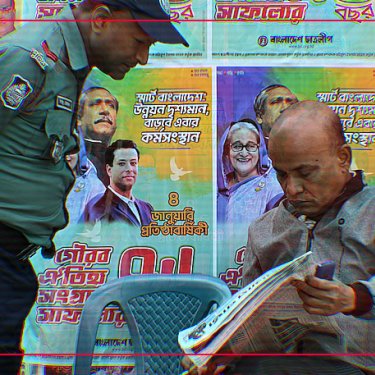Bangladesh: general elections put journalists at risk

With the general elections taking place on 7 January, Reporters Without Borders (RSF) condemns the lack of measures to protect Bangladeshi reporters and presents its recommendations so that they can work in safety.
RSF is concerned about the safety of journalists in a particularly tense climate, as some 120 million Bangladeshis are called to the polls on Sunday 7 January to elect new members of parliament. In recent months, attacks against journalists have multiplied, fostering a climate of terror favourable to the regime in power: some have been murdered, others imprisoned and dozens of reporters brutalised while reporting.
The government is preparing for a tense election, with the army deployed since 3 January for a period of at least a week to ensure, according to the authorities, that the elections are "free", "fair", "impartial" and "peaceful". The main opposition party, the Bangladesh Nationalist Party (BNP) - 20,000 of whose activists have been arrested and 88,000 others are facing legal action - decided to boycott the event in view of what it considers to be "another electoral sham". RSF has made a number of recommendations to journalists to prepare themselves against the risk of violence.
"The current government is ending its term of office as it began five years ago. By almost systematically censoring all critical information, turning a blind eye to violence against journalists and making abundant use of propaganda, it is confirming that it has lost all credibility when it comes to democracy. RSF calls on Prime Minister Sheikh Hasina and her party to end their harmful grip on information. We recommend that journalists take several steps to cover these elections in the safest possible way.
Since its controversial victory in the last elections, the government of Sheikh Hasina (of the Awami League, the centre-left party in power since 2009) has paid no heed to the repeated warnings of numerous press freedom organisations and associations. Sheikh Hasina has been listed by RSF as one of the 37 press freedom predators in 2021.
In 2023, three journalists were murdered with total impunity. Six media professionals are still in prison in the country, while dozens of others have been the victims of violence, particularly after publishing articles on government corruption or certain local potentates.
In recent months, election candidates, militias and student wings of the ruling party, as well as radical religious groups, have also stepped up their attacks on journalists, while the government looks on. During an opposition demonstration that degenerated on 28 October, around thirty journalists were attacked by demonstrators, both opponents and supporters of the government, as well as by the police.
The reign of fear
Few journalists still believe in a positive future for press freedom in the country, as Zulkarnain Saer Khan, a Bangladeshi journalist living in exile in London, told RSF: "Journalists bringing forth the wrongdoings of the current kleptocratic, autocratic government are never safe. When there is no press freedom, when anyone can be apprehended on trumped-up charges, [...] there really isn't much hope." In March 2023, in retaliation for one of his articles denouncing corruption in the Prime Minister's entourage, his own brother, who had remained in Bangladesh, was brutally beaten in front of his house by four unidentified individuals.
Another major threat to journalists is online censorship. Last September, the Bangladeshi authorities adopted a new cybersecurity law (CSA) that makes it possible to prosecute journalists and bloggers who criticise the government online. RSF also fears that communication networks will be cut off, as the government did during the previous elections at the end of 2018.
Security measures and recommendations
Given the lack of security measures for journalists wishing to cover the elections, RSF advises them to follow the following recommendations:
- If you are in the field, call your family members at regular intervals and let them know where you are.
- In the event of a check, clearly identify yourself and present a valid press card or letter of accreditation.
- If possible, activate and use: a tracking device such as an Airtag hidden in your clothes or the "Google activity" feature by giving a trusted third party access to your Google account. In the event of an abduction, these tracking devices will make it possible to identify your location.
- As far as possible, equip yourself with safety helmets, protective glasses, bullet-proof waistcoats and gas masks. A medical kit is also recommended.
- Identify the nearest emergency medical services in advance, so that you can obtain rapid treatment in the event of injury.
- To anticipate the loss, theft or seizure of your equipment, remember to use a password manager and activate double authentication (2FA) if possible on all your accounts. If you suspect that your devices are being spied on, don't hesitate to ask for help from RSF's Digital Security Lab, which can be contacted at this address: [email protected].
- Share the emergency contact details of RSF or other trusted organisations, as well as those of a lawyer, with members of your family so that they can contact them in an emergency.
To protect journalists in high-risk areas, RSF has also published a comprehensive Practical Guide to the Safety of Journalists, which can be consulted at this link.
